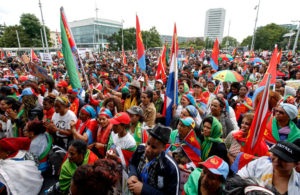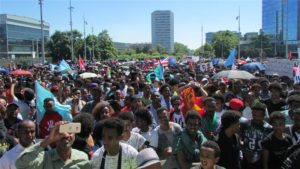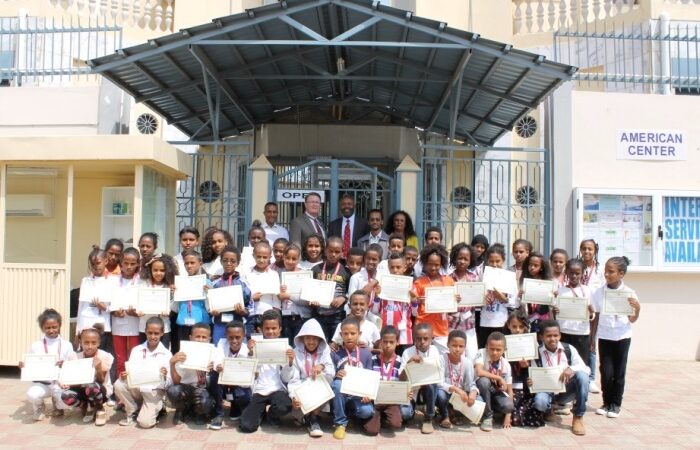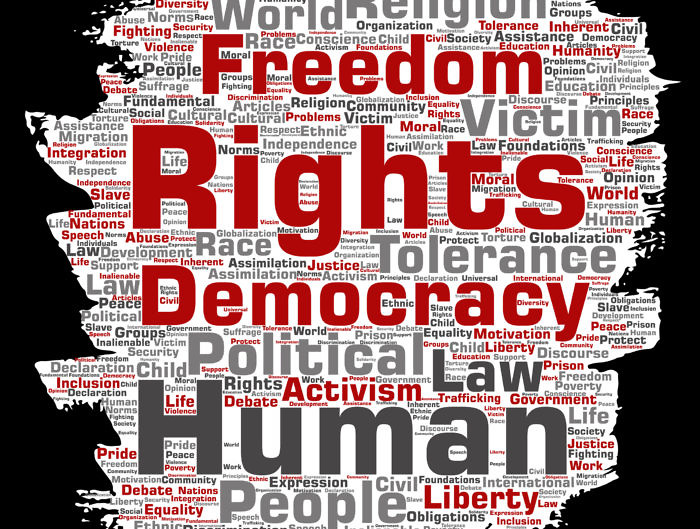For the second year in a row, a large gathering of Eritreans congregated in Geneva to voice their opinion on the issue of whether senior government and party officials in Eritrea are guilty of egregious crimes against the Eritrean people.
The occasion is the ordinary session of the UN’s Human Rights Council whose Commission of Inquiry concluded a year-long criminal investigation of Eritrea’s senior officials and concluded that, yes, there are reasonable grounds to believe that it has overseen, or failed to persecute, wide, systematic crimes–including enforced disappearance, torture and enslavement–of Eritreans.
 On June 21, Eritreans who support the government held a rally in Geneva to argue the following:
On June 21, Eritreans who support the government held a rally in Geneva to argue the following:
1. The Human Rights Commission should not have impaneled the Commission of Inquiry as the proper mechanism for human rights is the Universal Periodic Review;
2. The Commission of Inquiry did not visit Eritrea and therefore its information is incomplete;
3. The Commission of Inquiry did not consider the submittals of over 40,000 Eritreans who contradict its conclusions;
4. There is no rape in Eritrea, much less a systematic one, since Eritrea’s culture makes it a taboo;
5. There is no enslavement in Eritrea; there are youth who are serving their country in National Service, whose terms have been extended due to Ethiopia’s refusal to comply with international law, vacate Eritrean land and refrain from threatening Eritrea;
6. The migration of Eritreans is statistically comparable to migration of citizens of other poor countries who are not accused of human rights violations;
7. The report of the Commission of Inquiry is, just like sanctions on Eritrea, another unfair ruling to punish Eritrea for following an independent political path.
 On June 23, Eritreans who are opposed to the Eritrean government held a rally to make the following points;
On June 23, Eritreans who are opposed to the Eritrean government held a rally to make the following points;
1. The report of the Commission of Inquiry is something that every Eritrean family knows and we thank the Commission for speaking for the voiceless;
2. For the crimes to stop, the Human Rights Council must implement the recommendations of the Commission;
3. Those who have committed crimes against Eritreans must face justice, if not in Eritrea, then at international courts;
4. The indefinite conscription, which has become enslavement of Eritreans, must stop now.
5. Release all political prisoners immediately and bring the accused to court of law,
6. Stop immediately the culture of impunity that prevails in Eritrea and introduce rule of law,
7. Since the crimes committed in Eritrea are committed at the highest levels, and since it is unlikely for criminals to investigate themselves, they must be removed from power.
The next step is for the Human Rights Council to vote on whether to forward the recommendations of the Commission of Inquiry to the UN’s General Assembly and the Security Council.
If it is forwarded to the Security Council, then the next step is to await the decision of the Security Council on whether it wants to refer the case to the International Criminal Court (ICC) or an African Commission.
Since Eritrea did not ratify the Rome Statute, ICC can be instituted only if the Security Council makes the referral.
In the meantime, Eritrea’s ruling party, PFDJ, is being tried in the court of public opinion. This is ironic considering that the PFDJ only tries its opponents in the court of public opinion–after gagging everyone who can contradict its version of events.





Leave A Reply